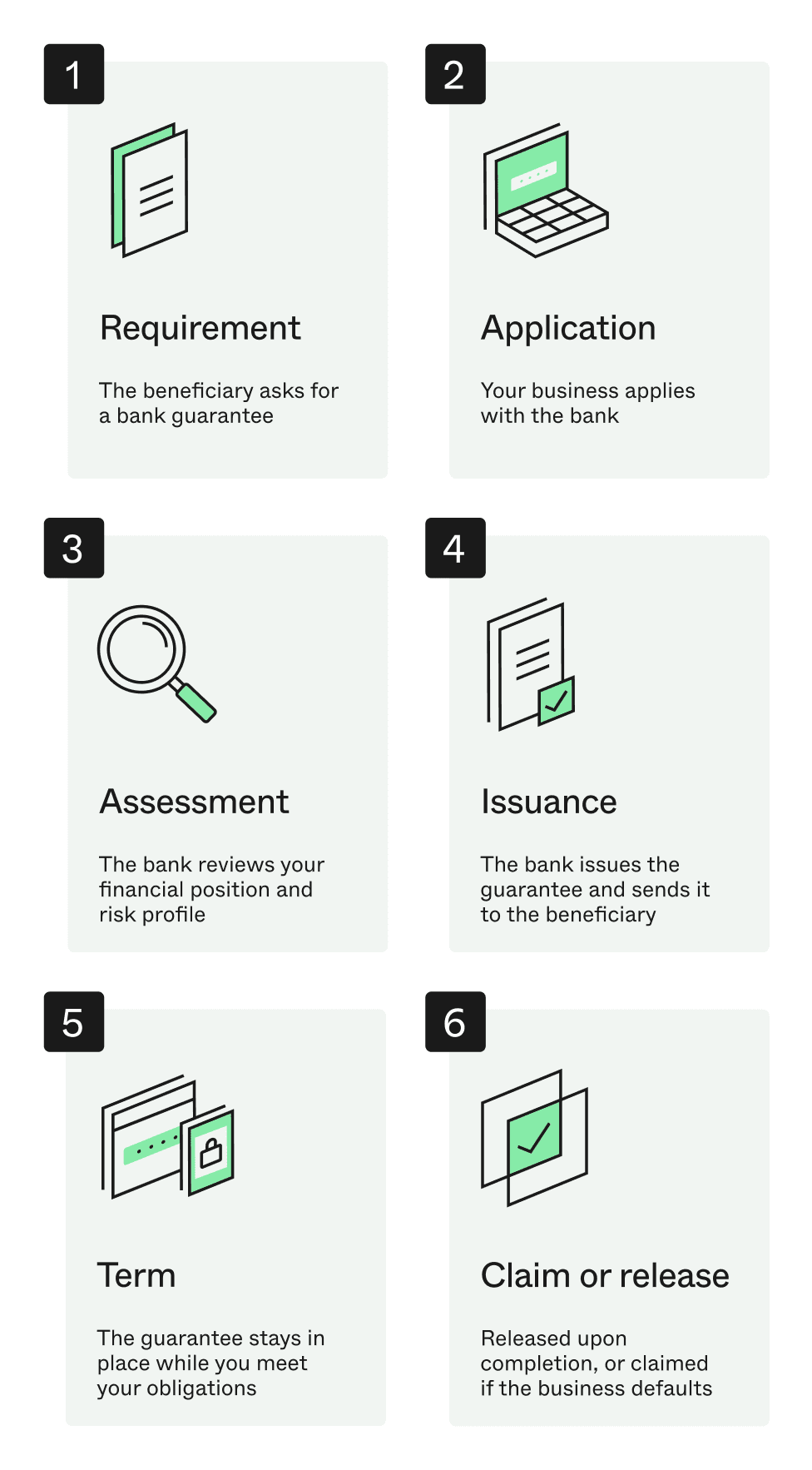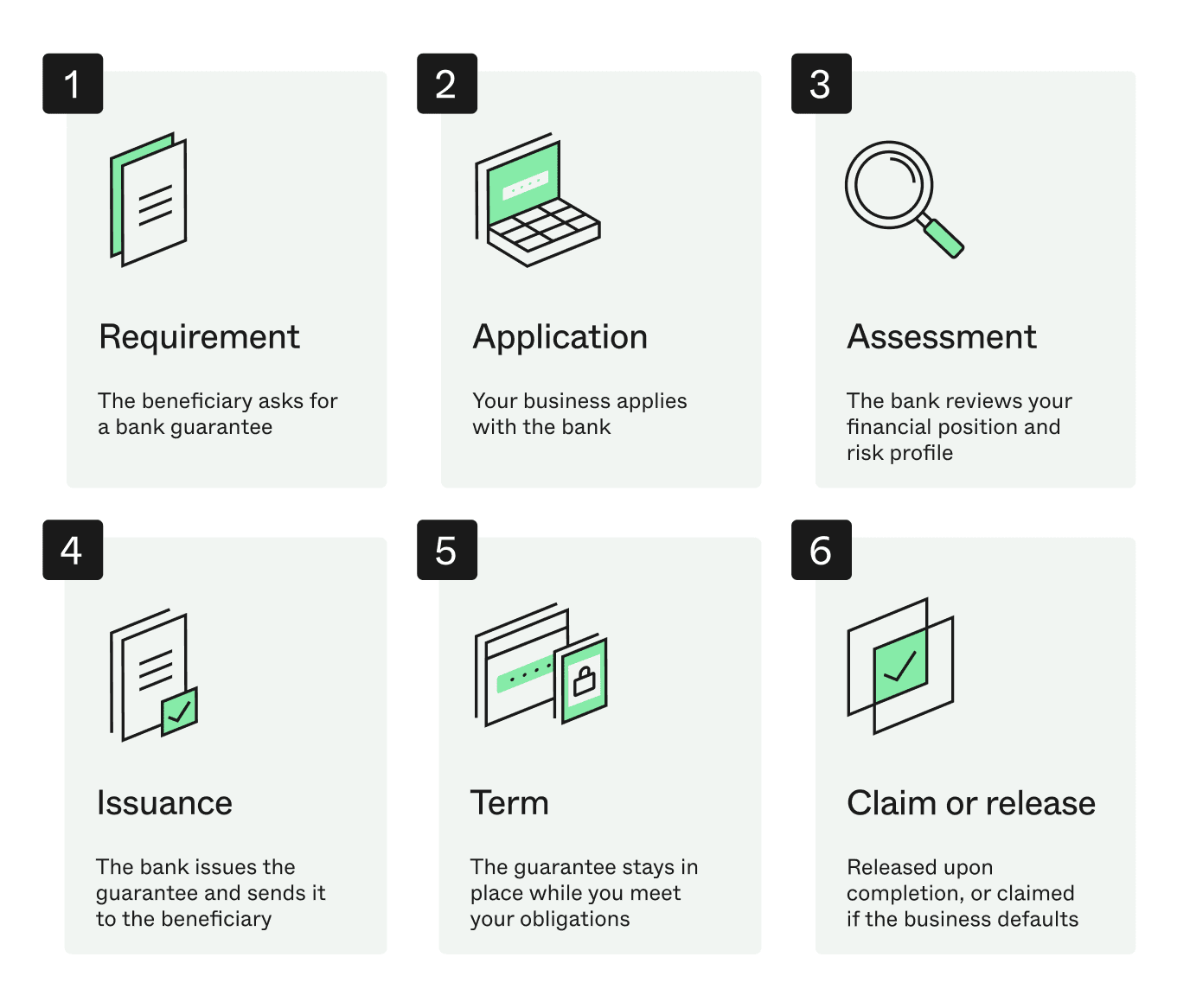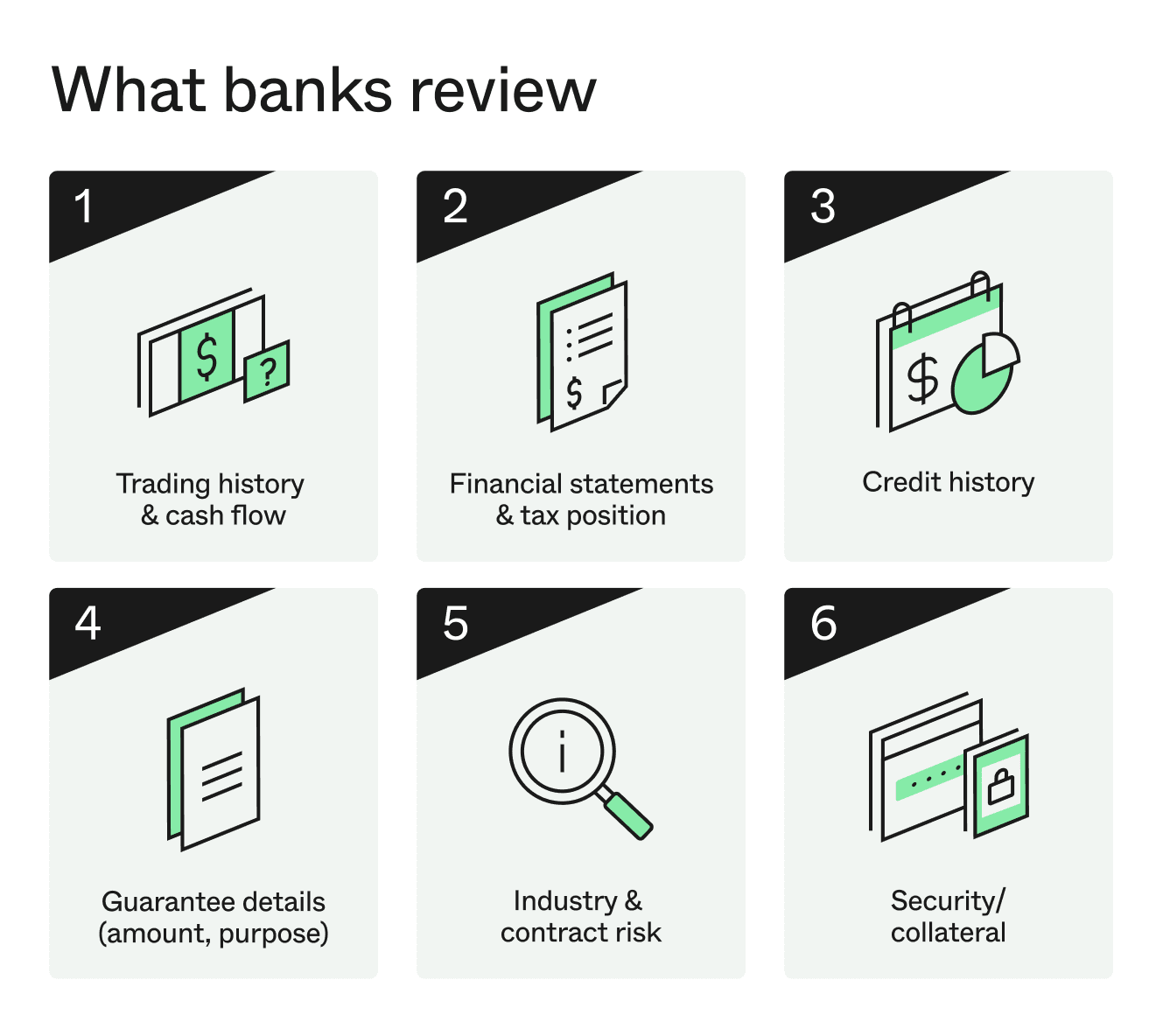Learn what a bank guarantee is, how they work, and the common fees. See how flexible funding can help you manage the impact on your business cash flow.
At a glance
- Many contracts, leases, and supplier agreements require a bank guarantee to provide assurance that financial obligations will be met.
- Knowing how bank guarantees work helps you weigh their advantages in building trust and credibility against the potential impact on cash flow.
- Flexible funding can help you manage that cash flow impact by providing liquidity to keep your operations running smoothly.
For many Aussie small businesses, growth often depends on winning contracts, securing leases, and locking in supplier agreements. Yet these opportunities frequently come with a request for a bank guarantee. It’s a common part of doing business, but one that’s important to understand before you commit.
This guide explains what you need to know about bank guarantees: how they work, what they cost, and when they’re required. We’ll also explore how to manage them and discuss flexible funding options that can help you secure opportunities when flexibility matters.
What is a bank guarantee?
A bank guarantee is a promise from your bank to pay a third party if your business cannot meet a contracted financial obligation. It acts as a form of security, giving suppliers, landlords, or project partners confidence that they will be paid even if something goes wrong.
Rather than using cash up front, the guarantee shows that your bank stands behind your business. This assurance can help you secure leases, win contracts, or build new supplier relationships that might otherwise be out of reach.
How does a bank guarantee work?
A bank guarantee sets out what happens if a business cannot meet a financial obligation under a contract. It outlines who is responsible, when the bank steps in, and how payment is handled. The goal is to give both parties certainty about how risks are managed before work begins or goods are supplied.
Common use cases
Bank guarantees are widely used in everyday business agreements. In construction, they protect project owners and head contractors by covering performance or defect risks. Suppliers may request them before releasing stock on account, while commercial landlords often accept them in place of a cash bond. In each case, the guarantee provides assurance that obligations will be met and helps strengthen trust between both parties.
Imagine you run a commercial painting business and secure a $120,000 contract with a new developer. Before work starts, the client requests a $20,000 bank guarantee to cover potential defects or delays. You apply through your bank, which reviews your financials and may ask for cash or a term deposit as security. Once approved, the guarantee is issued and sent to the client so the project can proceed.
Who is involved?
A bank guarantee involves three parties:
- Applicant: The business requesting the guarantee from the bank. The applicant is responsible for meeting the terms of the contract and reimbursing the bank if a claim is made.
- Beneficiary (aka Favouree): The third party, such as a landlord, client, or supplier, that requires the guarantee as security. The beneficiary can claim payment from the bank if the applicant does not meet their obligations.
- Bank: The financial institution that issues the guarantee on behalf of your business. The bank agrees to pay the beneficiary if a valid claim is made, then seeks reimbursement from you.



Step-by-step flow
Once a third party requests a guarantee, the process follows a few steps from application to release:
- Requirement: The beneficiary asks for a bank guarantee as part of a contract, lease, or supply agreement.
- Application: Your business submits details and supporting documents to the bank.
- Assessment: The bank reviews your financial position and risk profile.
- Issuance: Once approved, the bank issues the guarantee and sends it to the beneficiary.
- Term: The guarantee stays in place while you meet your obligations.
- Claim or release: If the contract is fulfilled, the guarantee is released. If your business defaults, the beneficiary claims the money from the bank, and the bank then seeks reimbursement from you.



This process offers clear protection, although it can take time and may require security that restricts cash flow. If your business needs to move quickly, several working capital solutions can give you the funds you need when you need them.
What do bank guarantees cost?
The cost of a bank guarantee varies between lenders and depends on your financial position, but it generally involves two main charges:
- Establishment Fee: This is a one-off application or processing fee the bank charges to assess your application and set up the guarantee.
- Ongoing Facility Fee: This is a recurring fee, often charged annually or quarterly. It’s typically calculated as a percentage of the total guarantee’s value and must be paid for as long as the guarantee remains active.
Beyond these direct fees, it’s important to factor in the “opportunity cost” of the security itself. If your guarantee is secured with a cash deposit, that is working capital your business cannot use for operations or growth.
This can leave a business short of cash for day-to-day needs like payroll or materials. This is where a business line of credit can help, giving you access to working capital as you need it to keep the business running smoothly, even while your cash is held as security by the bank.
What banks look at before issuing
Before approving a bank guarantee, lenders take a close look at your business’s financial strength and reliability. They review:
- Trading history and stability of cash flow
- Financial statements, BAS, and tax position
- Credit history for the business and directors
- The amount, purpose, and expiry of the guarantee
- Industry and contract risk
- Security arrangements, for example, a cash or term deposit held by the bank
In some cases, they may ask for additional security, such as a term deposit or other assets held with the bank.



For finance or operations managers, understanding this assessment process can help prepare documentation or compare guarantee requirements between banks. For business decision-makers, it can show how bank guarantee fees and security conditions differ between providers.
Benefits of bank guarantees
Bank guarantees can play an important role in helping businesses build trust and take on larger opportunities. They show partners, clients, or landlords that your business can meet its obligations, even if challenges arise.
Key benefits include:
- Security without immediate payment: A guarantee provides financial assurance to the other party without requiring cash to change hands upfront.
- Access to new opportunities: Many large contracts and supplier agreements require a guarantee before work or delivery can begin.
- Reduced financial risk: The guarantee clearly sets out who is responsible if the obligation is not met, protecting relationships and helping manage potential losses.
- Stronger credibility: Holding a guarantee can demonstrate financial stability and professionalism to new partners or clients.
For your painting business, a guarantee gives the developer confidence to award the job by reducing perceived risk and building a stronger working relationship. That trust can open doors to larger projects and repeat work.
While bank guarantees offer these advantages, they also rely on having cash or assets available to secure them. Alternatively, if you don’t have the cash or assets available to secure a bank guarantee, unsecured funding can provide the capital you need to fund the security deposit, helping you win the contract without tying up all your existing working capital.
Who can apply for a bank guarantee?
Bank guarantees are generally available to established businesses with a proven trading record and stable cash flow. They are often used by SMEs, contractors, and companies that regularly enter into supplier agreements or lease commercial premises. Newer or fast-growing businesses that may not yet have this financial history or collateral may find it harder to qualify.
When opportunity calls, be ready
Understanding how bank guarantees work puts you in control when securing contracts or managing suppliers. So while your cash is held to secure a guarantee, a Prospa Small Business Loan or Line of Credit can provide the flexible funds you need to keep operations running.Apply online and be ready for the next opportunity.








